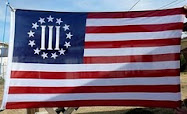Everyone knows that Americans don't understand irony. Soon after moving to England from the U.S., I discovered that my country was universally assumed to be an irony-free zone. I was at a dinner party when irony came up, and another guest launched into a diatribe against Alanis Morisette's song "Isn't it Ironic?" as an example of my compatriots' presumptive misunderstanding: "Rain on your wedding day is not ironic!" he railed.
"Serving utensils are not ironic! What's ironic is that she doesn't understand what irony means!" "No," I replied. "What's ironic is that she's Canadian."
Situational irony is distinct from, but analogous to, verbal irony: Both rely on the tension between a false or misleading appearance, and an underlying, contradictory reality. Alanis and I were both employing situational irony, when reality doesn't conform to expectation. Verbal irony is when reality doesn't conform to your statement. For the record, Americans are capable of employing both. Exhibit A for the defense: the first sentence of this piece. You may not find it ironic, although I will find it ironic if you don't, because I trusted you not to need me to spell it out for you.
Irony depends upon context, and the extra-verbal cues by which we ascertain intended meaning. In this case, the context includes my being American, which until a few days ago I would have considered reason enough to doubt that I could hold such views. Thanks to the recent uproar over the New Yorker Obama cartoon, however, I have learned my mistake. The reason why the cover, depicting Barack and Michelle Obama as flag-burning-Osama-loving-Afro-sporting-Muslim-militant-terrorist-fist-jabbe=rs, has created such a hullabaloo has everything to do with America's understanding of irony. It turns out, ironically, that Americans also think America doesn't understand irony -- or rather that the rest of America doesn't understand irony.
Apparently, my fellow Americans are under the impression that only people from New York are ironic. Everyone else will think that the cover means what it says, because they are too stupid, crass and literal to understand context, nuance, or implication. A pundit on a CBS news program differentiated herself emphatically from the rest of the literal-minded, simplistic nation, explaining: "I get that [it is satire] -- I get that. But I think that there may be people who just look at the cover and see it for what it is."
The New Republic agreed, arguing that the magazine "claimed not to support the allegations they were visually or rhetorically putting forward -- obviously! -- and yet a reader would have to have a fairly sophisticated understanding ... to immediately intuit the intended ironic distance."
Indeed: because that's how irony works. It relies upon a sophisticated-subtle, discriminating, complex understanding that appearances can deceive, that meaning can be oblique. It relies on not taking things at face value.
But increasingly we live in a culture of face value, a superficial world of skim-reading, snap-judgments, and thin-slicing, in which perception is all, and tends only to reconfirm pre-existing attitudes. So let's be clear: Anyone who thinks that the Obamas are secret terrorists is stupid enough to misunderstand the New Yorker cartoon. But that is no reason for shooting the messenger.
Satire -- advanced irony, if you like -- is supposed to be deadpan, and it ought to be dangerous, even inflammatory. Satire is polemical; it should test limits. Satire has faith in the intelligence of its audience, in part because it is itself a humor driven by ideas. The New Yorker cartoon, rightly, does not wink, or nudge the viewer. It plays it so straight that it reminded me of nothing so much as Stephen Colbert's satirical character on Comedy Central's The Colbert Report, the blustering, know-nothing right-wing pundit and Bush apologist whom Colbert himself once described as a "well-intentioned, poorly informed, high-class idiot."
One of Colbert's favorite targets is what he calls "truthiness," which is "truth, unfiltered by rational argument," for those, like Colbert's character and President Bush, who pride themselves on anti-intellectualism: "We're not members of the factinista. We go straight from the gut, right sir? ... We know that polls are just a collection of statistics that reflect what people are thinking in 'reality.' And reality has a well-known liberal bias."
Those comments come from a speech Colbert made, in character, before President Bush, at the White House Correspondents' Dinner in 2006. For my money it was one of the greatest moments of political satire in living memory. The only thing more breathtaking than Colbert's audacity was the stupidity of whoever had given him the opportunity to insult the president to his face. It turned out the man in question hadn't seen much of Colbert's show and took him at face value. Now that's ironic.
























